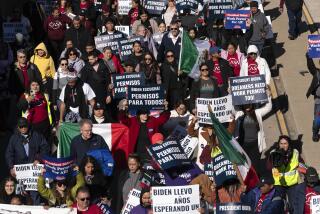Few Iraqis are able to find sanctuary within the U.S.
- Share via
WASHINGTON — Two years ago, an Iraqi man shepherded his wife and six children onto a bus that would take them to Turkey and away from the militants threatening to kill him for delivering water to the U.S. military.
Five countries, four continents and almost 18 months later, they arrived at the U.S.-Mexico border crossing at San Ysidro. The man, an Iraqi Christian who calls himself John, handed border officials a fake Greek passport and told them that “I was an Iraqi” and “needed their help.”
John and his family were granted asylum two months ago, but they are among the very few Iraqis able to resettle in the United States, where laws put in place after Sept. 11, 2001, have made it difficult for refugees to gain entry. The United Nations High Commissioner for Refugees estimates that about 2 million Iraqis have fled their country and an additional 40,000 to 50,000 more leave every month -- but only 466 have been granted entry to the United States since 2003.
On Tuesday, John and others testified before a Senate Judiciary Committee hearing intended to highlight the region’s refugee crisis, which has gained momentum since sectarian violence increased dramatically last year. Though State Department officials say the problem is one of their top priorities, lawmakers questioned the administration’s commitment to the issue, especially regarding Iraqis who worked for the United States.
Drawing comparisons to the refugee problem created after the Vietnam War, lawmakers framed the issue as one of moral obligation, strategic prudence and opportunity -- particularly to reopen contacts with Syria, where about 500,000 Iraqis have sought refuge, according to UNHCR.
“We should not repeat the tragic and immoral mistake from the Vietnam era and leave friends without a refuge and subject to violent reprisals,” said Sen. Patrick J. Leahy (D-Vt.), chairman of the Judiciary Committee.
“We have a special obligation to keep faith with the Iraqis who have bravely worked for us -- and have often paid a terrible price for it -- by providing them with safe refuge in the U.S.,” said Sen. Edward M. Kennedy (D-Mass.), chairman of the immigration subcommittee.
One new U.S. program offers special immigrant visas to Afghan and Iraqi translators working with the U.S. military, but only 50 are available each year.
The president also sets an annual quota for refugee admissions, including a set number for emergencies. For the 2006 fiscal year, which ended Sept. 30, Bush allocated 70,000 refugee admissions, 5,500 of which were designated for the Middle East and 10,000 of which were for emergencies. About 50,000 refugees were allowed into the U.S. last year, only 202 of whom were from Iraq.
Ellen Sauerbrey, the State Department’s assistant secretary for population, refugees and migration, said a lack of funding was one reason the administration has not gotten anywhere near the admissions ceiling for Iraqis.
Kennedy noted that the administration has budgeted $20 million for Iraqi refugees in fiscal 2007, while it is spending $8 billion a month to wage the war.
Sauerbrey also said that regulations put in place since the Sept. 11 attacks required all refugees to be individually screened by the Department of Homeland Security. “It’s one reason so few have been admitted since 2003,” she said. “It’s made it very difficult ... for people to pass through.”
In a separate news conference Tuesday, State Department spokesman Tom Casey responded to a question about the low numbers of Iraqi admissions by saying that “the important thing to understand is that Iraqi refugees are being treated no differently than refugees from any other country in the world.”
On Capitol Hill, John, who used only his first name, testified in Aramaic from behind a wooden screen, because he feared for the safety of his family. A Chaldean, or Iraqi Eastern Rite Catholic, John said that persecution was rendering Christianity almost extinct in Iraq and that his family had been “blessed” by asylum in the U.S.
“I ask that you continue to be as gracious to my former countrymen and fellow Chaldeans who have been forced to leave their homes,” he said.
More to Read
Sign up for Essential California
The most important California stories and recommendations in your inbox every morning.
You may occasionally receive promotional content from the Los Angeles Times.










